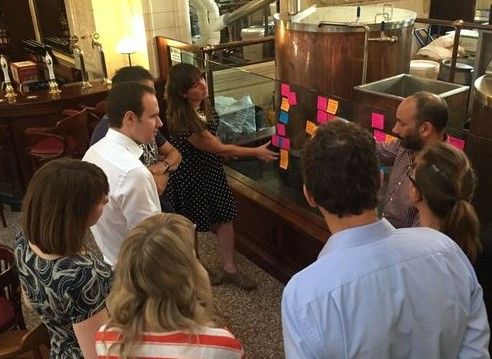An agile meet-up not a top-down waterfall

(Originally published June 2017.)
I started out with the intention to write about Agile Sheffield and how, on it’s second birthday, it’s helped me become more expert in agile. The first meet-up (led by Richard Joseph and pictured above) had ten people and we spent time noting what we wanted the group to become. (Update: I'm no longer involved in agile Sheffield).

Two years later, I still agree with what I listed though one word niggles slightly — expert. But don’t stop reading — this isn’t going to turn into a post-Brexit anti-expert diatribe where I condemn all agile training events and so-called gurus to an eternal waterfall-hell.

Over the last two years, Agile Sheffield has grown to 700 members and attendance is between 35–50 people. At last month’s meet-up, we held a quick retrospective and there were lots of comments that people most welcomed the conversations, activities and (I’m adlibbing a bit here) the culture of the group — the warmth, humour and openness. When asked for ideas for future sessions there were requests for more group work and discussions with greater opportunity to share difficulties and experiences. There wasn’t much demand for lots of expert speakers or formal presentations. It seems people want (cliche alert) a ‘meet-up not a top-down’.
The above statement is the opening line from the Agile Manifesto (my bold) which is often overlooked. It suggests we should strive to improve and (just as importantly) be prepared to share knowledge so others can learn too. I’ve been to some great presentations from very experienced agile practitioners — including at Agile Sheffield — or watched them online. After all (courtesy of the great Ackoff’s f-Laws)…
But, and my point is very simple here, I have sometimes learnt more through the Q&As at the end of those expert sessions where agile newbies have asked simple yet searching questions which have made the presenter pause and openly reflect on their approach.

So, have the Agile Sheffield meetups developed my agile expertise?
Yes they have, and just as importantly, they have reminded me of the importance of actively taking part, asking questions and encouraging others to do so. Is Agile Sheffield attended by experts? Yes and no — and, just as importantly again, it’s attended by people who are willing to share their knowledge or (like me sometimes — with my healthy dose of imposter syndrome) admit when they don’t have clue and want advice.
But what if I am an expert — maybe with a book to sell or an organisation to represent?
I’m certainly not saying you wouldn’t be welcome at a meetup.
If you’re focused on supporting others in becoming agile — your expertise, frameworks or experience is more useful to me if you know how to share your knowledge in such a way that I can reflect on it and apply it within my own context. It’s ok to admit you don’t have all the answers — no expert always does. Be open to questions and challenge and don’t dismiss someone’s point ‘cos they lead a traditional/waterfall organisation, are committed Jira users, have never used Slack or think ‘digital’ is simply the opposite of analogue. I’ve seen this and it’s uncomfortable and not right.
Remember that, at different points in time, we all started out from a position of ignorance.
And what if I really don’t know anything about agile and haven’t attended a meetup (or similar before)? Aka I am that ‘ignorant person’!
Have a look on meetup, twitter, eventbrite, etc or, if you’re local, come along to Agile Sheffield. Say hi online in advance so people know to look out for you — particularly if you’re arriving alone or will feel nervous. (2023 update: I'm no longer involved in agile Sheffield)
If you’re attending a meetup, unconference or formal training, don’t wait for someone else to ask a question or to share their experience. By speaking up you can can help frame the resultant discussion and gain even more benefit. If you feel you’re the ‘quiet one’ in the group — it doesn’t mean you have to be passive. And if you don’t have much agile expertise remember you have expertise in your own experiences and difficulties which can be just as valuable to share.